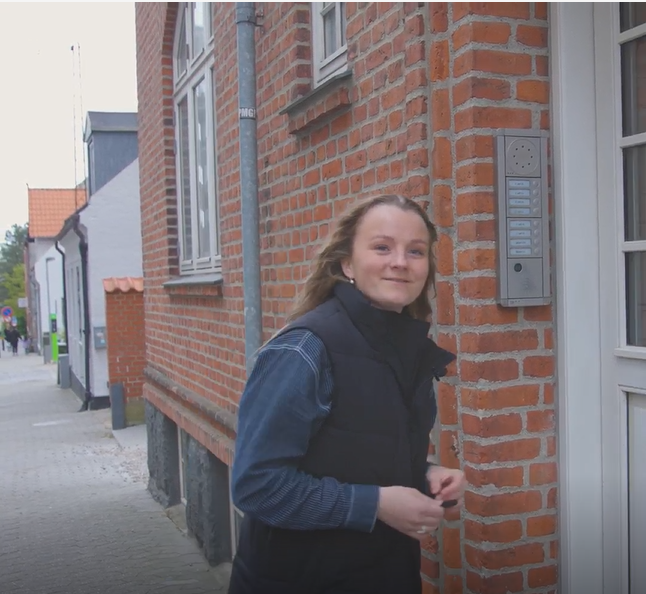Everything You Need to Know About SU
Have you been accepted into your dream program?
It’s an exciting time where you’ll learn new things, meet new people, and maybe even move out (it’s okay to be excited about that).
One of the most important things to manage as a student, whether you live at home or away, is your finances, and this is where the student grant (SU) comes into play. Because when we’re fortunate enough to live in a country that essentially pays us to go to school, you need to know how it works, how to apply for SU, how much you can receive, and what to be aware of.
So read on and learn how to make the most of your SU.
What is SU?
Okay, let’s start from the very beginning. What is SU really? Besides feeling like “free” money that hits your account every month because you’ve started studying.
SU stands for Statens Uddannelsesstøtte (the Danish Government’s Educational Support) and is a financial aid that you can receive as a student in Denmark. SU helps ensure that you can focus on your studies without worrying too much about your finances.
SU consists of two parts: the SU grant and the SU loan. The SU grant is money you receive without having to pay it back, while the SU loan is money you borrow and must repay after completing your education.
How to Apply for SU?
But how do you apply for SU? Do you already find the thought of applying for SU overwhelming? Then hold on before you panic, because it’s actually quite simple, and we’ll guide you through it step by step.
It’s a relatively straightforward process. Follow these steps to get started:
- Create a user account on MinSU, which you can find at su.dk.
- Log in using MitID and follow the instructions on the page.
- Fill out the application with the necessary information about your education and your financial situation.
- Submit your application and wait for a response.
Remember to apply in good time, as processing times can vary. If you apply early, you also avoid the stress of running low on funds at the start of your studies.
When Can You Apply for SU?
Now that you know how little it is, you’re probably itching to get started! However, to apply for SU, you must have received confirmation of your admission to an educational program. For youth education, you can apply a month before your 18th birthday. For higher education, you can apply a month before the start of your studies. To ensure that you receive your money on time, apply as soon as it is possible.
Who Can Apply for SU?
To be eligible to apply for SU, there are certain requirements you must meet:
- You must be a Danish citizen or have the same rights as a Danish citizen.
- You must be enrolled in an approved education program.
- You must be actively studying and meet the requirements set for your education.
If you are a foreign citizen, you may also be able to apply for SU, but this requires a special assessment of your residency status. Remember to investigate this well in advance so that you are ready to apply when you start your education.
How Much Can You Get in SU?
And now to the million-dollar question! How much can you receive in SU?
The answer isn’t straightforward, as the amount you can get in SU depends on several factors, including your age, whether you live at home or independently, and whether you’re enrolled in a youth education or higher education program.
- Youth Education: If you live at home, you can receive up to DKK 1,686 per month. If you live independently, you can receive up to DKK 6,321 per month.
- Higher Education: If you live at home, you can receive up to DKK 3,321 per month. If you live independently, you can receive up to DKK 6,321 per month.
Additionally, you can apply for an SU loan, which can supplement your SU stipend by up to DKK 3,274 per month. Carefully consider whether you want to take out a loan, as it must be repaid, but it may be necessary to make your finances work.
You can always check the rates here.
How to apply for living-away SU?
If you have moved out, you will be able to receive the higher living-away-from-home SU, which is more than for those living at home. To apply for living-away-from-home SU, you must be able to document that you live on your own and no longer at your parents’ house.
It’s not enough to just send a selfie from your apartment – unfortunately. You can do this by, for example, submitting a rental contract or documentation for home ownership.
Remember that your address must be registered correctly in the civil registry. It is important to get this sorted out in good time so that you can receive the correct SU from the start.
How much can you earn while receiving SU?
SU is a good support, whether you live at home or on your own – but it’s not always enough if you want to have fun experiences with friends or save up for the future.
Fortunately, it is possible to work while receiving your SU, but there is a limit to how much you can earn without having your SU reduced. This limit is called the “fribeløb” (free allowance) and varies depending on whether you live at home or away, and whether you are in secondary education or higher education.
- Living at home: You can earn up to 15,900 DKK per month before tax.
- Living away: You can earn up to 13,876 DKK per month before tax.
If you exceed these amounts, you risk having to pay back your SU. Therefore, it’s important to keep track of your income and adjust your working hours accordingly. Working alongside your studies can be a good way to earn extra money, but be careful not to overload yourself – your studies come first. If you want to check on this, you can find all the information on the SU website.
How to repay your SU loan?
One of the options with SU is the SU loan, which we mentioned earlier. If you choose to take out an SU loan, you will need to start repaying it once you have completed your education. Repayment typically begins one to two years after finishing your studies, and you will receive information about the specific terms from the Danish Agency for Higher Education and Science in your E-boks.
Repayment usually occurs over a period of 7-15 years, depending on how much you have borrowed. You can always choose to pay off more or the entire loan early if your finances allow it. The interest rate on SU loans is relatively low compared to other types of loans, making it an affordable option for most.
What happens if you stop your education?
If you stop your education, you must inform the SU Agency immediately so that you do not receive any further payments. Consequently, your SU payments will stop, and if you have received too much, you will need to repay it. If you have taken an SU loan, you will also need to start repaying it, even if you have not completed your education.
Can you receive extra SU for special needs?
Yes, it is possible to apply for extra SU if you have special needs. This may be relevant if you have a disability, are a parent, or have other specific challenges that make it difficult to complete your education on time. You can apply for disability benefits, caregiver allowances, or extra SU credits depending on your situation. On SU.dk, you can find specific rates for your special needs.
Can Foreign Students Get SU?
Yes, foreign EU citizens can receive SU if they are in Denmark to study and work at least 10-12 hours a week alongside their studies.
Tips to Get the Most Out of Your SU
Create a Budget: We know it sounds boring, but make an overview of your income and expenses so you know what you have to work with each month.
Work Part-Time: If possible, find a student job that can supplement your SU and also gives you valuable experience. Just remember to keep an eye on the income limit.
Take Advantage of Student Discounts: Many places offer discounts for students, so be sure to ask for them—yes, we know it can be awkward. But think about it: if you save a 20 or 50 kr here and there, it adds up! Also, check out various apps and websites that collect student discounts for you.
Keep an Eye on the Income Limit: Make sure you don’t earn too much alongside your SU to avoid having to pay money back.
Prioritize Your Expenses: Think about what is necessary and what you can do without. It can be tempting to spend money on fun and games, but remember to think long-term.
Be Prepared for Unexpected Expenses: Set aside a little money each month so you have a buffer in case something unexpected happens. It can save you from a lot of worrie



